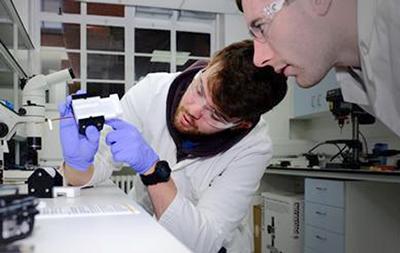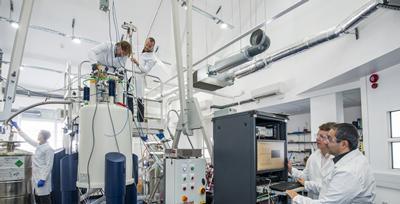Major funding to expand Southampton’s cutting-edge Magnetic Resonance research

Southampton’s Magnetic Resonance (MR) research section (Magres@Soton) is set to expand its facilities with a £2m upgrade funded by the Engineering and Physical Sciences Research Council (EPSRC).
Magres@Soton is a globally-recognised centre of excellence focused on the science and applications of nuclear magnetic resonance (NMR) spectroscopy and imaging (MRI).
The £2m EPSRC grant will ensure the Centre stays competitive into the next decade, enabling its academics to contribute at the forefront of magnetic resonance research.
Professor Marcel Utz, Head of Magnetic Resonance at Southampton and Co-Principal Investigator of the project, said: “The Magnetic Resonance Centre at Southampton is a world-leading facility for NMR and MRI research. This funding will upgrade the NMR spectrometers that underpin our work.”
The money will be used to:
- Replace an obsolete 400MHz solid-state NMR console with a modern system
- Install a modern 700MHz liquid-state NMR system
- Provide a dedicated 400MHz liquid-state NMR spectrometer in support of Southampton’s ongoing research in dynamic nuclear polarisation
Marcel said: “These upgrades and replacements will maintain our research facility at the international standard. They will help us to successfully complete our current projects, as well as to expand our research into new areas.”
Magres@Soton collaborates extensively with academics across the University, throughout the UK, Europe, the USA, Asia and Israel.

The new equipment will enable the growing MR team at Southampton to expand its impact by making its expertise more widely available to the academic community through local, national and international collaborations, course offerings and user training.
Marcel added: “We have recently been awarded some significant project funding, such as an EPSRC Platform Grant, and a grant from the EU Commission Future and Emerging Technologies Open scheme. The new facilities will boost our research output by providing more reliable, modern NMR systems that will ensure we can more effectively support these projects, as well as free up equipment and staff time to engage in new collaborations.”
Magnetic Resonance has a long history at Southampton and its impact stretches across a variety of disciplines, from Medicine to Biological Sciences to Engineering. Current research topics include techniques that enhance NMR signals by factors of many thousands, the development of novel contrast agents, and the integration of MR with lab-on-a-chip technology. Ultimately, these techniques may empower chemistry and the life sciences in various ways, such as providing new methods for the clinical diagnosis of cancer by MRI.
Project Principal Investigator Professor Mark Spearing, Vice-President Research and Enterprise, said: “The University of Southampton has been at the forefront of Magnetic Resonance Research and its application in a diverse range of fields for several decades. I am delighted that this proposal to EPSRC has been successful as it will allow our researchers to maintain this leading position for the foreseeable future.”
“I am also delighted that the new equipment will support educational activities and the development of a new masters’ programme as well as supporting undergraduate projects. The strong synergy between cutting-edge research and education is a key attribute of our University.”
Marcel added: “Magnetic Resonance is one of the very few technologies that can look into the structure of matter without damaging it. This is currently exploited in MRI but has the potential to be used across many other fields of science and technology such as organic chemistry and molecular biology. It can help us explore the detailed structures of molecules, as well as the inner workings of cells and tissues.”
“The facilities upgrade will also support collaborative activities in areas such as microfluidics (lab-on-a-chip), analytical and structural chemistry, pharmaceutical, electrochemistry and imaging.”
“The EPSRC grant will enable us to focus on developing these technologies and extend the applicability of MR.”
A new taught masters degree in Magnetic Resonance is due to be launched in 2018, aimed at aspiring scientists who want to enter this research field. The new equipment will ensure the students are working on industry-standard equipment thus being prepared for a competitive position in the job market.
To find out more about Magnetic Resonance research at Southampton visit www.southampton.ac.uk/magres
